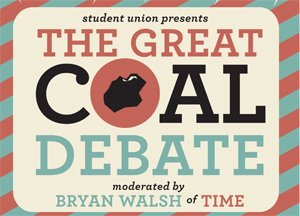“I am convinced that all we need to do to bring an overwhelming insistence of the new generation that we stem the tide of environmental disaster is to present the facts clearly and dramatically,” said former U.S. Sen. Gaylord Nelson, the founder of Earth Day.
He was speaking in 1970, and 40 years later, people still are struggling to stem the tide of environmental disaster.
In the spirit of Gaylord Nelson, Washington University students have organized two educational forums in celebration of Earth Day April 22 that they hope will present the facts clearly and dramatically — The Great Coal Debate and Going Green: A Corporate Perspective on Energy and Sustainability.
The Great Coal Debate

Last semester, there was much buzz on campus about coal, much of it provoked by “America’s Energy Future,” a symposium about the National Research Council’s recommendations for our energy future. But senior Kady McFadden, who is majoring in political science and environmental studies, felt many students didn’t know enough about the issue to be comfortable taking a stand. So when a Student Life editorial called for an event where students could learn about coal, she was inspired to organize one.
The Great Coal Debate, taking place at 5 p.m. Tuesday, April 27, in Graham Chapel, will provide a forum for two highly articulate and formidable speakers to present the case for and against coal.
Speaking for coal will be Fred Palmer, senior vice president of government relations for Peabody Energy, the largest private-sector coal company in the world. Peabody coal generates 19 percent of U.S. electricity.
Speaking against coal will be Bruce Nilles, the National Coal Campaign director for the Sierra Club, the largest grassroots environmental organization in the United States. The Sierra Club advocates halting construction of new coal-fired plants and retiring existing coal-fired plants in the next two decades.
The debate, which is sponsored by Student Union, will be moderated by Bryan Walsh, environment correspondent for Time magazine and author of the “Going Green” column about environmental issues.
Both presenters eat, sleep and breathe coal, McFadden says, just in opposite ways.
“The goal is not to present one side or the other,” she says. “We just wanted to get people in that room, get people thinking about this issue, because I think it’s really important.”
Going Green: A Corporate Perspective on Energy and Sustainability

Senior Jeffrey K. Feiereisen’s 12-page document addressing every conceivable contingency that might arise during the panel he is organizing includes 50 questions — whittled down from 150 — about sustainable energy generation and use.
- “Do you know your company’s carbon footprint?“
- “What do you see driving companies to face sustainability issues?”
- “If relying on the market isn’t the answer, then what is?”
- “Will it take public policy?”
Feiereisen says, “I listened to Charlie Rose interviews to come up with questions for the panel.”
At 7 p.m Thursday, April 29, some of those questions will be posed to a panel of executives from Ameren, Boeing, GE Energy and Monsanto.
The panel, to be moderated by Pratim Biswas, PhD, the Stifel and Quinette Jens Professor and chair of the Department of Energy, Environmental & Chemical Engineering, will take place in Whitaker Auditorium.
The event is sponsored in part by the student chapter of the Institute of Electrical and Electronics Engineers (IEEE), the biggest professional technical association in the world.
Feiereisen, who is an electrical engineering major, helped revive the moribund WUSTL chapter of the IEEE, which he now chairs.
“We went from three people last year to 400 this year,” he says.
Other sponsors are the Alumni Association, Career Center, Earth Month 2010, St. Louis chapter of the IEEE, IEEE Power & Energy Society, Olin Business School, School of Engineering & Applied Science, Student Union and Weston Career Center.
“I wanted to experience organizing a major event,” Feiereisen says of the panel, “but I also wanted to do something for the university before I leave.”
Much like Gaylord Nelson, he believes in the students: “The students are really motivated, and if you give them an opportunity, they’ll grab it,” he says.